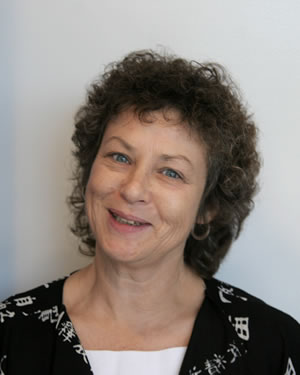Darby Penney
When Darby Penney took a job with the New York State Office of Mental Health (OMH) in 1987, she never thought that her own psychiatric history would have any bearing on her work. Though active in social justice movements, she was not aware that ex-patients opposed to the degradation they experienced in the name of treatment had organized to demand their rights. In 1989, while staffing a statewide planning advisory committee, she met members of this movement. “I looked around the room, “Penney recalls, “and realized that I was one of them, not one of the bureaucratic ‘suits.’That was the beginning of my education as an ex-patient activist.” In 1992, responding to pressure from advocates, OMH created a cabinet-level position to bring ex-patients’ perspectives into policy-making and the commissioner asked Penney to take the job.
For the next nine years, as OMH’s director of recipient affairs, Penney became an increasingly vocal advocate for the rights of people with psychiatric disabilities. She established peer advocacy programs, and worked to reduce restraint and seclusion, to increase opportunities for self-determination and to promote self-help programs.
In 1998, she learned that the State Archives office was seeking to document the history of mental health services. Realizing that no official documents had been created by patients themselves, Darby began to collect oral histories from current and former patients, with the encouragement of archives staff. The project, which profiled 200 individuals and is now available to researchers and the public, was “an historical gift to the state; there is nothing comparable anywhere,” says Kathleen Roe, Chief of Archival Services for New York State. “This was real pioneering work.”
When Willard Psychiatric Center closed in 1995, suitcases belonging to deceased patients were found in an attic. Rescued by the State Museum, the luggage was filled with old photographs, clothes, letters, and other belongings dating back to the 1890s. Here, Penney realized, was the material needed to commemorate those forgotten and marginalized lives. “These people had jobs, families, accomplishments and aspirations before they were locked up,” she says, noting that many of those who were involuntarily committed were immigrants.
Over the next few years, Penney, photographer Lisa Rinzler, and Peter Stastny, M.D., researched the lives of the suitcase owners. In January 2004, an exhibit of photographs, artifacts and letters – “Lost Cases, Recovered Lives” – opened at the State Museum in Albany. Many of the 600,000 who visited during the show’s 9-month run wept as they walked through the exhibition. With foundation funding, the exhibit is now being re-created in a traveling version.
Penney’s opposition to coercive policies like forced electroshock and involuntary outpatient commitment eventually cost her her government job. Today, she heads the Community Consortium, a non-profit organization working for community integration and citizenship rights for people with psychiatric disabilities. By day, she works as a program manager and Senior Fellow at the Alden March Bioethics Institute at Albany Medical College.
Recognizing that the United States lags behind many other countries in the use of non-medical, non-coercive healing approaches for psychiatric patients, in 2003 Darby helped found the International Network of Treatment Alternatives for Recovery. To advance the rights of those who belong to the largest disability group in the country, she says, “We must break the stranglehold of the pharmaceutical industry on this field.”
 Photo by Dorothea von Haeften
Photo by Dorothea von Haeften